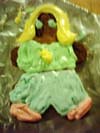(#48)
I’m a public school kid. I spent my elementary years in an inner city school where the teachers manually cranked out math assignments from the old mimeograph and our school books were donated by richer school districts. From sixth until twelfth grade, I moved into one of those richer school districts and enjoyed the novelty of a Xerox, but watched as our 30 year old natatorium began to collapse in on itself. I finished off my educational career at a state university, where funding was ample enough to begin building two new dorms after I had graduated. What I’m try to say here is that I’ve seen friends in their private school uniforms and met up with old classmates who described garden parties on the greens of Princeton, but have never experienced it myself. It’s a mystery, but an intriguing one.
I suppose that’s why I’m always seeking out books about boarding schools, those elite institutions where the rich make contacts and children are separated from their families for the sake of education. During The Magicians and the Harry Potter novels, the magic didn’t interest me as much as life within those closed circles. The Secret History was a trove of insight into a privileged world. So when I picked up Old School by Tobias Wolff, it was love.
Old School follows the literary exploits of an unnamed narrator in a post-World War II school where writing is a sport with very tangible prizes. Each year, three different writers visit the school and meet with the one boy whose literary work as sufficiently impressed them. Competition to be that one boy is great, driving the students to curl over their typewriters night after night in a flurry of concentration. Winning not only gains a famous author’s attention, but the audible admiration and silent fury from the student body. In other words: nothing like a public school.
Wolff manages to lay out a school that seems ridiculously overblown in theory, but tangible in print. He also has a firm grip on the voices of the authors featured in the story: Robert Frost, Ayn Rand, and Ernest Hemingway. Their conversations with the fictional characters are perfect counterparts to their real-life works. Wolff has a keen ear for voice and has clearly dedicated himself to the Great American Classics.
The book turned into something much more than a look into the foreign world of boarding schools. It inspired me to track down all of those Hemingway novels that I read in high school, to give William Faulkner another try, to continue to avoid finishing The Fountainhead (I’m not perfect, you know). It’s time to bring that public school education back into action. So, thanks, Tobias Wolff.
Tuesday, October 12, 2010
Subscribe to:
Post Comments (Atom)


No comments:
Post a Comment